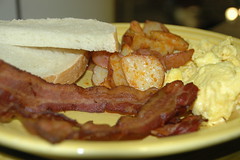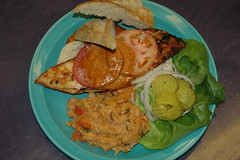Check out our Diet Reviews
===========================
As I have often said in the past, weight loss and weight gain are directly affected by Input and Output. Many people would like to think that weight reduction occurs with the use of sophisticated theories like thermogenesis (calories burned by digestion), wonder supplements like hoodia or the miraculous properties of certain herbal products such as Wu long tea.
The fact remains, however, there are only 2 ways the human body can reduce weight: By reducing food intake or by increasing energy expenditure (by exercise) – I am excluding other factors such as medical conditions, etc.
One common reason behind the inability to attain weight loss for long time periods is that people are trying to do too much at the same time. Working on one factor at a time, is the key to long - term weight reduction.
The quantity of food intake directly influences weight loss and weight gain. It’s not what you eat but how many calories you consume. In other words, if you are exceeding your daily food requirement by 500
 calories per day - it doesn’t matter whether the 500 calories come from bacon or raw celery sticks - you will gain the exact same amount of weight. Your body doesn’t register what type of food you consume, it just registers calories – regardless of the type of diet you are participating in. Whether your diet is low in carbs, high in protein or is based on food combining or whatever - doesn’t make any difference. The bottom line is calorie intake is the only thing that counts.
calories per day - it doesn’t matter whether the 500 calories come from bacon or raw celery sticks - you will gain the exact same amount of weight. Your body doesn’t register what type of food you consume, it just registers calories – regardless of the type of diet you are participating in. Whether your diet is low in carbs, high in protein or is based on food combining or whatever - doesn’t make any difference. The bottom line is calorie intake is the only thing that counts.There is no doubt, however, that certain foods are higher on the nutrient scale than others. The point I’m trying to make is that you should
 concentrate on reducing your calorie consumption first and worry about food quality later. I’m not saying the latter is not important but should be tackled separately. Trying to do both at the same time is often too hard to handle, let alone worrying about increasing your level of exercise participation.
concentrate on reducing your calorie consumption first and worry about food quality later. I’m not saying the latter is not important but should be tackled separately. Trying to do both at the same time is often too hard to handle, let alone worrying about increasing your level of exercise participation.So, concentrate first on decreasing food quantity – the foods you are eating. Find out how many total daily calories you would be comfortable with and reduce to that level. It’s much easier (for long-term success) to set your target weight loss to 1-1.5 pound per week. One pound of fat roughly equals to 3500 calories. A reduction, therefore, of 500 calories a day equals 1 pound per week. That’s a good start.
Once you have adjusted your food intake, you can begin working on improving food quality in terms of nutrient value. After improving both factors, make an assessment and if you are not happy with your progress you can begin to work on energy expenditure (physical activity).
Taking it one step at a time, allows you to isolate each component with less stress, making it easier to succeed in the long run. Trying to adjust all components at the same time, however, is just too stressful and usually results in short term weight loss.
Categories: Diet Plan, Diet Program
3 comments:
Are you saying that I should keep eating what I'm eating, even the junk food?
I think he means to keep eating what you are eating bnlznx2yd402u7lo@put2.netureduce your calorie
Yes I mean continue the same diet you are used to, but reduce the calories. Once you accomplish that you can start improving it by substituting junk food with more nutitious alternatives.
Post a Comment